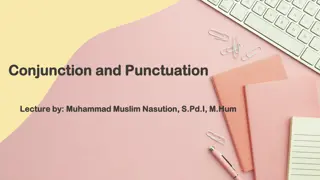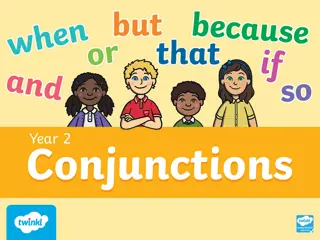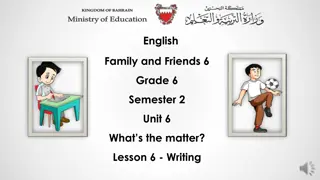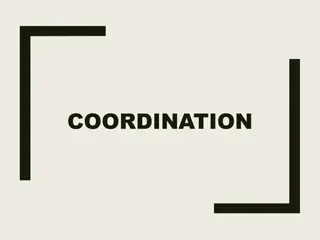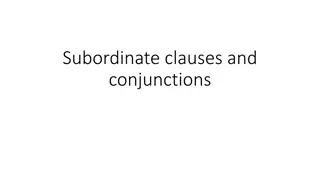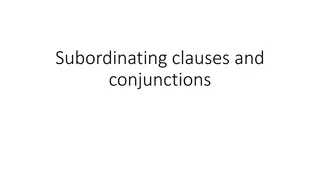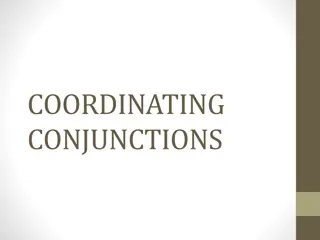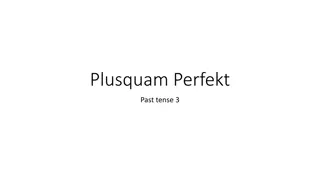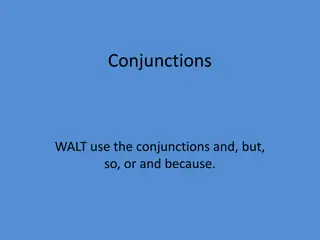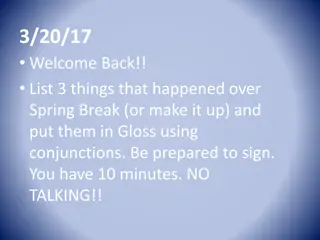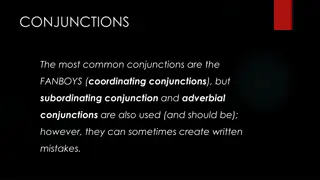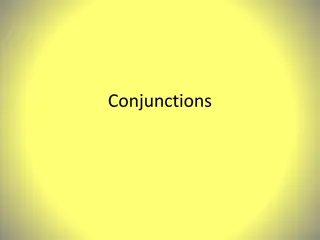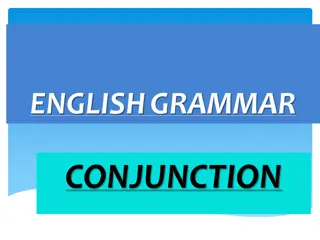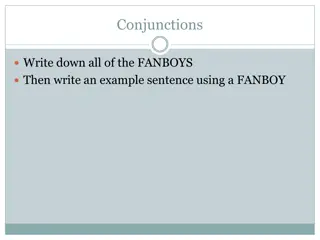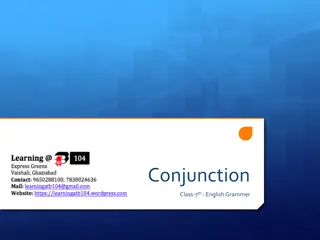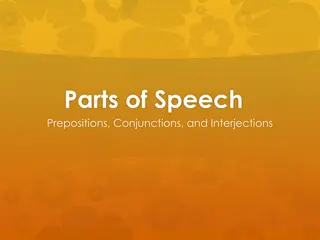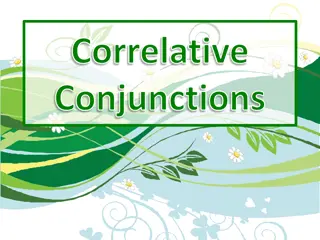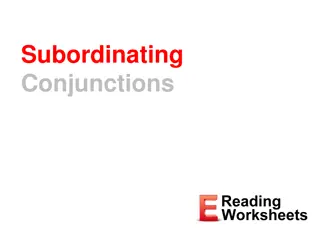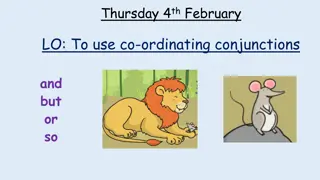Understanding Conjunctions: A Comprehensive Guide
Conjunctions play a crucial role in language by joining words and phrases together to form complex sentences. This guide covers the basics of conjunctions, including types, functions, examples, and usage rules for coordinating and subordinating conjunctions. Explore the world of conjunctions through clear explanations and helpful examples.
Download Presentation

Please find below an Image/Link to download the presentation.
The content on the website is provided AS IS for your information and personal use only. It may not be sold, licensed, or shared on other websites without obtaining consent from the author. Download presentation by click this link. If you encounter any issues during the download, it is possible that the publisher has removed the file from their server.
E N D
Presentation Transcript
I,B,(P.G).COLLEGE,PANIPAT CLASS ENGLISH(H) TOPIC- Conjunction
SINCERE THANKS TO DR. AJAY KUMAR GARG PRINCIPAL ,I.B P.G COLLEGE,PANIPAT DR.MADHU SHARMA HOD ENGLISH DEPARTMENT
PRESENTED BY SONAL DOGRA ASSISTANT PROFESSOR IN ENGLISH
Conjunctions A conjunction is a word like and, but, although, because. Conjunctions have an important function because they join other words and phrases together. Without conjunctions, we could only make very, very simple sentences. See also What is a Conjunction? Introduction to Conjunctions We can consider conjunctions from three aspects. 1.What do Conjunctions Do? Conjunctions have two basic functions or "jobs": Coordinating conjunctions are used to join two parts of a sentence that are grammatically equal. The two parts may be single words or clauses, for example: -Jack and Jill went up the hill. -The water was warm, but I didn't go swimming. Subordinating conjunctions are used to join a subordinate dependent clause to a main clause, for example: -I went swimming although it was cold. Here are some example conjunctions:
Here are some example conjunctions: Coordinating conjunctions Subordinating conjunctions and, but, or, nor, for, yet, so although, because, since, unless 2.What do Conjunctions Look Like? Conjunctions have three basic formats: a.single word for example: and, but, because, although b.compound (often ending with as or that) for example: provided that, as long as, in order that c.correlative (surrounding an adverb or adjective) for example: so...that 3.Where do Conjunctions Go? Coordinating conjunctions always come between the words or clauses that they join. Subordinating conjunctions usually come at the beginning of the subordinate clause.
Coordinating Conjunctions A coordinating conjunction joins parts of a sentence (for example words or independent clauses) that are grammatically equal or similar. A coordinating conjunction shows that the elements it joins are similar in importance and structure: There are seven coordinating conjunctions, and they are all short words of only two or three letters: and, but, or, nor, for, yet, so Look at these examples - the two elements that the coordinating conjunction joins are shown in square brackets [ ]: I like [tea] and [coffee]. [Ram likes tea], but [Anthony likes coffee]. Coordinating conjunctions always come between the words or clauses that they join. When a coordinating conjunction joins independent clauses, it is always correct to place a comma before the conjunction: I want to work as an interpreter in the future, so I am studying Russian at university.
However, if the independent clauses are short and well-balanced, a comma is not really essential: She is kind so she helps people. When "and" is used with the last word of a list, a comma is optional: He drinks beer, whisky, wine, andrum. He drinks beer, whisky, wine and rum. The 7 coordinating conjunctions are short, simple words. They have only two or three letters. There's an easy way to remember them - their initials spell "FANBOYS", like this: F A N B O Y S f o r and nor but or yet so
Subordinating Conjunctions A subordinating conjunction joins a subordinate (dependent) clause to a main (independent) clause Here are some common subordinating conjunctions: after, although, as, because, before, how, if, once, since, than, that, though, till, until, when, where, whether, while Look at this example: main or independent clause subordinate or dependent clause Ram went swimming it was raining. although
main or independent clause subordinate or dependent clause subordinating conjunction A subordinate or dependent clause "depends" on a main or independent clause. It cannot exist alone. Imagine that somebody says to you: "Hello! Although it was raining." What do you understand? Nothing! But a main or independent clause can exist alone. You will understand very well if somebody says to you: "Hello! Ram went swimming." A subordinating conjunction always comes at the beginning of a subordinate clause. It "introduces" a subordinate clause. However, a subordinate clause can come after or before a main clause.


